Jiheum Yeom
Does Your Voice Assistant Remember? Analyzing Conversational Context Recall and Utilization in Voice Interaction Models
Feb 27, 2025Abstract:Recent advancements in multi-turn voice interaction models have improved user-model communication. However, while closed-source models effectively retain and recall past utterances, whether open-source models share this ability remains unexplored. To fill this gap, we systematically evaluate how well open-source interaction models utilize past utterances using ContextDialog, a benchmark we proposed for this purpose. Our findings show that speech-based models have more difficulty than text-based ones, especially when recalling information conveyed in speech, and even with retrieval-augmented generation, models still struggle with questions about past utterances. These insights highlight key limitations in open-source models and suggest ways to improve memory retention and retrieval robustness.
EdiText: Controllable Coarse-to-Fine Text Editing with Diffusion Language Models
Feb 27, 2025Abstract:We propose EdiText, a controllable text editing method that modify the reference text to desired attributes at various scales. We integrate an SDEdit-based editing technique that allows for broad adjustments in the degree of text editing. Additionally, we introduce a novel fine-level editing method based on self-conditioning, which allows subtle control of reference text. While being capable of editing on its own, this fine-grained method, integrated with the SDEdit approach, enables EdiText to make precise adjustments within the desired range. EdiText demonstrates its controllability to robustly adjust reference text at broad range of levels across various tasks, including toxicity control and sentiment control.
NanoVoice: Efficient Speaker-Adaptive Text-to-Speech for Multiple Speakers
Sep 24, 2024



Abstract:We present NanoVoice, a personalized text-to-speech model that efficiently constructs voice adapters for multiple speakers simultaneously. NanoVoice introduces a batch-wise speaker adaptation technique capable of fine-tuning multiple references in parallel, significantly reducing training time. Beyond building separate adapters for each speaker, we also propose a parameter sharing technique that reduces the number of parameters used for speaker adaptation. By incorporating a novel trainable scale matrix, NanoVoice mitigates potential performance degradation during parameter sharing. NanoVoice achieves performance comparable to the baselines, while training 4 times faster and using 45 percent fewer parameters for speaker adaptation with 40 reference voices. Extensive ablation studies and analysis further validate the efficiency of our model.
VoiceGuider: Enhancing Out-of-Domain Performance in Parameter-Efficient Speaker-Adaptive Text-to-Speech via Autoguidance
Sep 24, 2024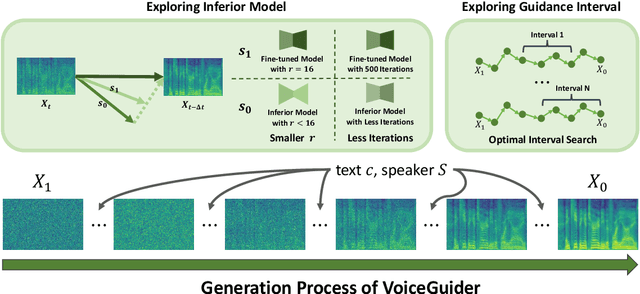


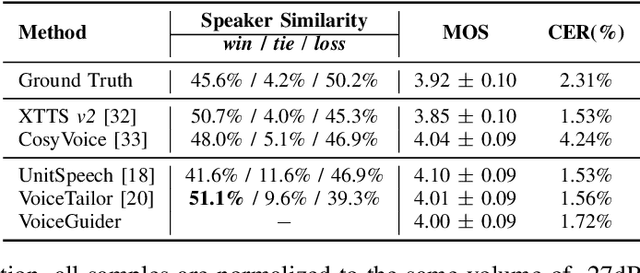
Abstract:When applying parameter-efficient finetuning via LoRA onto speaker adaptive text-to-speech models, adaptation performance may decline compared to full-finetuned counterparts, especially for out-of-domain speakers. Here, we propose VoiceGuider, a parameter-efficient speaker adaptive text-to-speech system reinforced with autoguidance to enhance the speaker adaptation performance, reducing the gap against full-finetuned models. We carefully explore various ways of strengthening autoguidance, ultimately finding the optimal strategy. VoiceGuider as a result shows robust adaptation performance especially on extreme out-of-domain speech data. We provide audible samples in our demo page.
VoiceTailor: Lightweight Plug-In Adapter for Diffusion-Based Personalized Text-to-Speech
Aug 27, 2024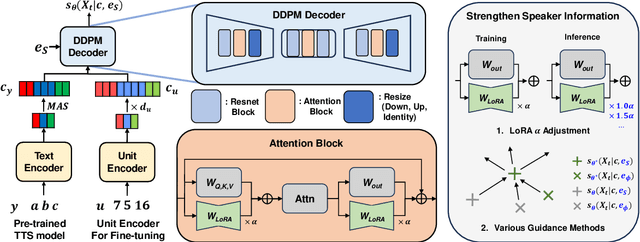

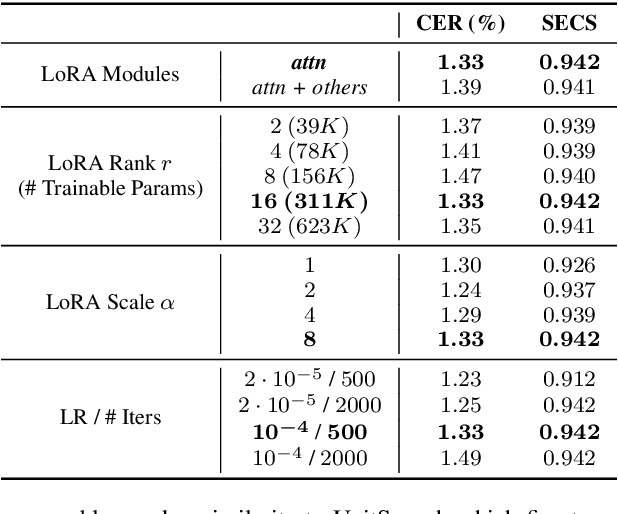
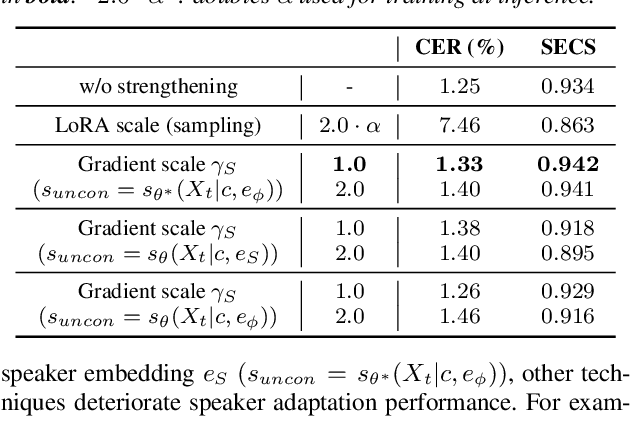
Abstract:We propose VoiceTailor, a parameter-efficient speaker-adaptive text-to-speech (TTS) system, by equipping a pre-trained diffusion-based TTS model with a personalized adapter. VoiceTailor identifies pivotal modules that benefit from the adapter based on a weight change ratio analysis. We utilize Low-Rank Adaptation (LoRA) as a parameter-efficient adaptation method and incorporate the adapter into pivotal modules of the pre-trained diffusion decoder. To achieve powerful adaptation performance with few parameters, we explore various guidance techniques for speaker adaptation and investigate the best strategies to strengthen speaker information. VoiceTailor demonstrates comparable speaker adaptation performance to existing adaptive TTS models by fine-tuning only 0.25\% of the total parameters. VoiceTailor shows strong robustness when adapting to a wide range of real-world speakers, as shown in the demo.
UnitSpeech: Speaker-adaptive Speech Synthesis with Untranscribed Data
Jun 28, 2023Abstract:We propose UnitSpeech, a speaker-adaptive speech synthesis method that fine-tunes a diffusion-based text-to-speech (TTS) model using minimal untranscribed data. To achieve this, we use the self-supervised unit representation as a pseudo transcript and integrate the unit encoder into the pre-trained TTS model. We train the unit encoder to provide speech content to the diffusion-based decoder and then fine-tune the decoder for speaker adaptation to the reference speaker using a single $<$unit, speech$>$ pair. UnitSpeech performs speech synthesis tasks such as TTS and voice conversion (VC) in a personalized manner without requiring model re-training for each task. UnitSpeech achieves comparable and superior results on personalized TTS and any-to-any VC tasks compared to previous baselines. Our model also shows widespread adaptive performance on real-world data and other tasks that use a unit sequence as input.
 Add to Chrome
Add to Chrome Add to Firefox
Add to Firefox Add to Edge
Add to Edge